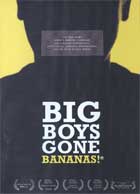
Big Boys Gone Bananas 2011
Distributed by The Video Project, PO Box 411376, San Francisco, CA 94141-1376; 800-475-2638
Produced by WG Films
Directed by Fredrik Gertten
DVD, color, 88 min.
Sr. High - General Adult
Activism, Business, Economics, Internet
Date Entered: 04/08/2014
Reviewed by Michael J. Coffta, Business Librarian, Bloomsburg University of PennsylvaniaAt first glance, one may be puzzled that this documentary is about the release and viewing of another documentary. The substance of the film, however, is a wildly unique tale of the irrepressible volition of the filmmakers in the face of brutish corporate power and media manipulation.
The Swedish filmmakers, chiefly Fredrik Gertten, made a film prior to entitled Bananas*. This latter film examined the successful lawsuit by Nicaraguan banana farmers against Dole in 2007. The farmers had won the case in a California court with evidence that Dole had introduced pesticides that caused sterility, withheld critical information, and took part in other misconduct. Dole learned of the creation of this film and threatened Gertten with a protracted series of intimidation tactics and legal action. Specifically, Dole wanted to bar the viewing of the first film at a Los Angeles film festival in 2009. After much contemplation, the filmmakers went ahead and screened the film at the film festival.
This film gives a blow by blow account of Dole’s extensive campaign against the filmmakers. Dole’s tactics blanketed the media and the Internet, and included buying the film’s name on Google, saturating film-aligned web sites with Dole ads, and “AstroTurfing,” (i.e. creating an artificial grassroots movement in the media). Perhaps the most cautionary and revealing lesson of this film is the corporate world’s prevailing thought that the millions spent by Dole in this effort was actually money well spent.
The film continues with the filmmakers’ counter-counterstrike. The filmmakers gained a great deal of solicited and unsolicited support in their homeland of Sweden, leading to a nationwide boycott of Dole, agitation by free speech groups, and even a screening of the film in the Swedish Parliament.
This review would do a grave disservice to the reader if it hinted at the film’s ending. It is gripping and heartfelt, and rivals any fictional drama that Hollywood or others may offer. Moreover, viewers need to understand that this is not just a simple case of an assault on freedom of speech, it is a troubling revelation of the extent of potential Internet manipulation and coercion by corporate power.